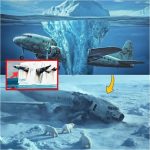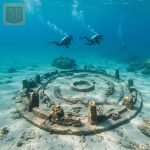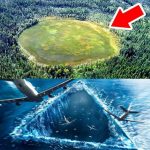Unearthing Atlantis: The Aegean Sea Serpent Discovery

A remarkable discovery beneath the turquoise waters of the Aegean Sea has left archaeologists and marine explorers both awestruck and unsettled—a massive serpentine fossil stretching across the seabed, its skeletal coils eerily reminiscent of creatures once thought to exist only in myth. This extraordinary find raises tantalizing questions: Could this be the first tangible evidence of the legendary sea serpents whispered about in ancient Greek lore, or perhaps even a link to the fabled lost civilization of Atlantis?

The discovery, made during a routine underwater excavation, has captivated the scientific community. The sheer size and structure of the remains defy conventional classification, prompting debates among scientists, historians, and mythologists alike. Some experts argue that the fossil may represent an unknown marine reptile from prehistory, a species that has eluded discovery until now. Others contend that this find could be proof that myths often echo forgotten truths, suggesting that the stories of sea serpents were rooted in actual encounters with extraordinary creatures.
The implications of this discovery extend beyond mere curiosity. If these remains are indeed linked to the mythical sea serpents described in ancient texts, they could reshape our understanding of the relationship between myth and reality. The ancient Greeks often spoke of massive, serpent-like creatures lurking beneath the waves, and this fossil could provide a tangible connection to those tales, bridging the gap between folklore and the natural world.

As divers continue to explore the site, the Aegean Sea guards its secrets tightly, revealing only fragments of a story that may rewrite natural history. The surrounding area is rich in archaeological significance, with remnants of ancient shipwrecks and artifacts that hint at a complex maritime culture. This context adds another layer of intrigue to the serpent fossil, suggesting that the myths of Atlantis and its denizens may not be as far-fetched as once believed.
Moreover, the discovery has sparked renewed interest in the search for Atlantis itself, a civilization long thought to be a mere figment of imagination. Could the Aegean Sea hold the keys to unlocking this ancient mystery? The possibility tantalizes explorers and historians alike, urging them to delve deeper into the depths of the ocean.
In conclusion, the Aegean Sea serpent discovery is more than just an astonishing fossil; it represents a confluence of myth, history, and science. As researchers grapple with the implications of this find, we are left to wonder: is this discovery rewriting natural history—or unlocking Atlantis itself? The mysteries of the deep continue to beckon us, challenging our understanding of the past and inviting us to explore the boundaries of reality and legend











